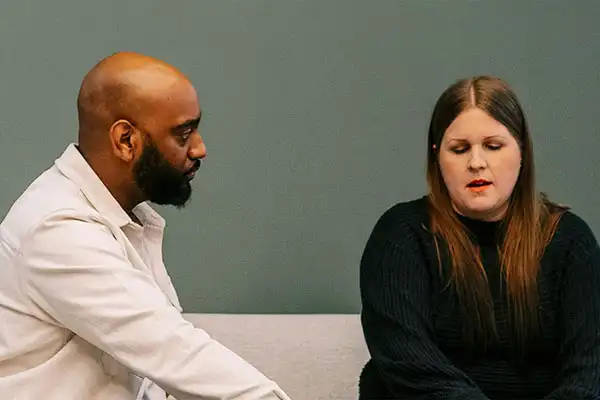Outpatient PTSD Treatment
At Stairway Outpatient Center, our goal is to provide everything you need to heal from trauma, regain your strength, and reclaim your life.

Treating PTSD in Los Angeles County
If you or a loved one experienced a traumatic event and the symptoms are not going away, you could be struggling with PTSD. For most of us, the flashbacks, anxiety, and stress associated with a traumatic event go away within 2-8 weeks. But for others, symptoms not only continue, but continue to worsen. The U.S. Department of Veterans Affairs shows that 6 out of 10 women and 5 out of 10 men will experience a highly traumatic event in their lifetime and every trauma has a risk of PTSD.
Today, many of us see PTSD as a veteran’s disorder. Yet, 6% of the adult population will have PTSD at some point during their lifetime. Anyone can develop post-traumatic stress disorder following a traumatic event and once it occurs, it’s critical to get treatment.
At Stairway Outpatient Center we specialize in treating individuals with trauma and PTSD
Our careful selection of staff ensures that you’re treated by highly qualified professionals in a high staff-to-patient ratio center, with a mix of group and individual therapy, and programs designed around your needs and your availability. We aim to have everything you need to help you recover from trauma and get your life back.
What is PTSD?
Post-traumatic stress disorder occurs after someone has been through a traumatic event. In a normal trauma progression, someone experiences trauma and then gradually begins to feel safe and to heal from that event in the weeks following. Normally, the timeline is about 2-8 weeks, during which someone might experience significant stress, flashbacks, and anxiety.
In PTSD, the body does not let go of the trauma. Instead, you remain frozen in adrenal response, leading to tension, stress, anxiety, flashbacks, and other symptoms. Those symptoms also do not go away, but instead begin to cause more and more complications, negative reinforcement, and worsening mental health. For most, PTSD does not recover without treatment.

Who Gets PTSD?
- Stress
- Environment
- Support system
- Mental health at the time of trauma
- History of mental health
- Behavior and personality
- Resilience
- Genetics
- Intensity and duration of the trauma
The risk factors for PTSD are very broad. That’s why it’s important to assess the pre-exposure risk factors as part of treating PTSD. Without knowing why you did not recover from trauma initially, you cannot help someone recover from trauma now.
Trauma can occur anywhere. It can occur from a car accident, after serving in the military, because of domestic abuse, because of a partner leaving, because of a family member or friend dying, because of a family member or friend being sick, because of a divorce, and many other reasons. The more out of control and helpless you feel in a situation, the higher the risk of the trauma resulting in complications like PTSD. Most importantly, if you’re already dealing with a lot, for example an anxiety disorder or other trauma, the trigger for developing PTSD can be lower because your ability to cope with things is lower.
Signs & Symptoms of PTSD
PTSD is characterized by flashbacks, sleeplessness, and emotional extremes. For many people, it also means complications like substance use disorder, depression, and worsening family relationships.
- Flashbacks or memories of trauma that are difficult to distinguish from reality
- Nightmares
- Insomnia
- Detachment and feeling disconnected
- Losing interest in hobbies and activities
- Feelings of worry, guilt, or sadness
- Outbursts, mood swings, and extreme reactions
- Headaches
- Stomachache and nausea
- Avoidance of memories, people, and places associated with trauma
- Memory problems
- Hyper vigilance
- Negative worldview of the self and those around them
The symptoms of PTSD often heavily overlap with the symptoms of depression and anxiety. PTSD can also result in co-occurring disorders including substance use disorder and depression, both of which may also require treatment.
Outwardly, PTSD looks a lot like someone is struggling with anxiety and depression, responding with extreme emotions, and having trouble managing their habits. Inwardly, it can feel like reliving a nightmare over and over again where nothing and no one is safe. If you’re living in a constant state of trauma, there is help and therapy interventions can help you get your life back.
Diagnosing PTSD
Getting treatment for PTSD means going to your doctor. From there, you’ll be referred to a specialist where you can receive a diagnosis for PTSD. In most cases, you’ll need a referral from your doctor in order to ensure you get full coverage from your insurance provider. You can also reach out to Stairway for assistance with making the first steps to getting your diagnosis.
You qualify for a PTSD diagnosis if you have had the following symptoms for 1 or more months.
- Have experienced a traumatic event
- Intrusive thoughts or reexperiencing memories
- Avoidance symptoms
- Cognition and mood symptoms
- Arousal and reactivity symptoms
- Depersonalization

Even if you don’t get a diagnosis for PTSD, if trauma is interfering with your quality of life, you still want to get help and treatment. That means looking into a treatment center, going to therapy, and getting access to the tools you need to improve your life.
Our PTSD Treatment Services in LA
Stairwell Outpatient Center is an LA-based mental health treatment center. We offer a track specializing in PTSD treatment, led by our staff specializing in helping individuals recover from complex trauma. With Stairway, you get a holistic approach including long-term outpatient treatment, personalized treatment program, and complementary treatments to help you improve quality of life around the treatment.
Need Assistance?
Not sure about your coverage or have questions? Give us a call—we're here to help!
Call (888) 450 1738

Outpatient Treatment
At Stairway, we put the focus on delivering long-term and comprehensive treatment for PTSD. When you visit our clinic, you can keep coming for as long as you need it, whether that’s the traditional 40-90 days to recovery from PTSD or a longer-term program to support ongoing recovery.
Our outpatient PTSD treatment means you show up to our clinic 3-5 days per week or on the weekends.
- Group therapy in 90-minute sessions
- 5-3 hours of individual therapy per week
- Complementary therapy based on your needs
- Case management
- Family therapy and sessions
Our program is a best fit for anyone living in or around the LA area, who can easily visit our clinic as part of their day. In addition, with a variety of programs including evening, morning, and afternoon as well as a weekend option, we help you fit treatment into your daily life.
Outpatient treatment is effective, affordable, and maximizes the coverage you’ll get from your insurance.
Evaluation & Personalization
You, your mental health, and your trauma are unique. It’s critical that you receive a personalized treatment program, tailored around your needs, your environment, your mental health, and your trauma. That’s why we build every PTSD program based on an initial evaluation and then updated throughout the program. We work with you to understand pre-exposure risk factors and build a program designed to help you mitigate symptoms now, cope with symptoms you can’t treat immediately, and then use CBT to work on behaviors and thought patterns that allow you heal.
Plus, with program progression based on milestones and your own progression, you stay in treatment as long as you need – only moving to the next step when you’re fully ready.

Individual & Group Therapy
Our PTSD treatment program blends individual counseling, individual therapy, and group therapy with complementary approaches and medication to ensure you get the best results.
That means:
Treatment is aligned with your primary doctor
Counseling and group counseling are a core part of treatment
Group behavioral therapy such as CBT and DBT are implemented to help you understand behavior, thought patterns and trauma responses
Individual therapy including CBT and EMDR are used to help you understand the trauma response, change your behavior patterns, and reduce sensitivity to triggers and trauma so that you can move past a traumatic event
With group and individual therapy, you benefit from both personal insight and experience from your peers. And, we’ll work with you to ensure that exposure therapy, cognitive behavioral therapy, and counseling are all aligned with your needs and mapped to your personal recovery timeline.
Holistic Treatment
PTSD impacts every part of your life. It’s not unusual for PTSD to cause co-occurring disorders like substance use disorders, anxiety, and depression. PTSD affects your eating habits, your lifestyle, your relationships, your creativity, your self-confidence, and your ability to express yourself.
That’s why we have a whole-body or holistic approach to PTSD treatment. At Stairway, we incorporate mental and physical wellness, social support, and family support into our treatment with:
Family group therapy
Fitness and nutrition
Art for therapy
12-step programs
Transcranial magnetic stimulation
Neurofeedback (neurotherapy)
Legal Assistance
The goal is to give you the tools to live a healthy and happy life. That means helping you get to a stable start, so you can focus on recovery.
Insurance Coverage for PTSD Treatment
Your insurance provider most likely covers PTSD. As an outpatient PTSD treatment program, Stairway helps you qualify for the highest possible coverage from your provider. Reach out, and we’ll help you figure out if our treatment services are covered by your plan.
Aftercare
PTSD treatment is typically delivered over 40-90 days depending on your needs and progress. If you need more than that, Stairway is here. But, whenever you graduate, you’ll have access to our aftercare and alumni programs, ensuring you can get ongoing support. That means touchpoints at milestones, access to ongoing therapy, and options to get therapy and treatment to help you cope with other problems. When you’re with Stairway, we’re here for every step of the way.

Get Help with PTSD in LA
If you or a loved one is struggling with trauma, experiencing the symptoms of PTSD, or has been diagnosed with PTSD, it’s important to get help. Treatment can help you overcome and move past PTSD, even if you’ve been struggling with the disorder for years. Recovery can take time, but with the ongoing outpatient PTSD treatment at Stairway Recovery, you have all the time you need to understand your trauma, build resilience, and learn how to improve your life for the future.
If you or a loved one needs help, get in touch, Stairway can help you move through the process of talking to your doctor and moving into treatment.

 Megan holds a Master’s degree in Clinical Psychology from Pepperdine University. She takes a holistic approach, building upon her client’s strengths and resources. Trained in EMDR and Ego State Therapy, she also integrates Internal Family Systems (IFS) and body-based somatic therapies into her practice to help clients regulate their nervous system and address trauma contributing to addiction issues. In addition to working at Stairways, Megan works in private practice as an AMFT, specializing in women’s health issues.
Megan holds a Master’s degree in Clinical Psychology from Pepperdine University. She takes a holistic approach, building upon her client’s strengths and resources. Trained in EMDR and Ego State Therapy, she also integrates Internal Family Systems (IFS) and body-based somatic therapies into her practice to help clients regulate their nervous system and address trauma contributing to addiction issues. In addition to working at Stairways, Megan works in private practice as an AMFT, specializing in women’s health issues. Shayne graduated with a Master’s in Counseling from Loyola Marymount University. He is trained in Cognitive Behavioral Therapy (CBT) and solution-focused techniques, with a special emphasis on supporting recovery from addiction and substance use disorders (SUD). Shayne believes that therapy should empower clients to reclaim their lives and move beyond merely surviving to thriving in recovery.
Shayne graduated with a Master’s in Counseling from Loyola Marymount University. He is trained in Cognitive Behavioral Therapy (CBT) and solution-focused techniques, with a special emphasis on supporting recovery from addiction and substance use disorders (SUD). Shayne believes that therapy should empower clients to reclaim their lives and move beyond merely surviving to thriving in recovery. Amanda graduated with a Master’s degree in Counseling Psychology with a specialization in Psychological Trauma from California Lutheran University. She is trained in psychodynamic theories with a focus on family systems and practices from a client-centered treatment approach. Amanda’s work is deeply rooted in respect, empathy, reliability, and professionalism. In addition to seeing clients in private practice, she works with individual clients and runs group therapies at Stairway Resource Center, under the supervision of Rosa Blasi-Harris, LMFT#129195.
Amanda graduated with a Master’s degree in Counseling Psychology with a specialization in Psychological Trauma from California Lutheran University. She is trained in psychodynamic theories with a focus on family systems and practices from a client-centered treatment approach. Amanda’s work is deeply rooted in respect, empathy, reliability, and professionalism. In addition to seeing clients in private practice, she works with individual clients and runs group therapies at Stairway Resource Center, under the supervision of Rosa Blasi-Harris, LMFT#129195. Michael has been an avid and successful entrepreneur since 2004, with experience in various industries including; entertainment, production, retail consumer goods, and transitional residential programs and multi-unit housing facilities.
Michael has been an avid and successful entrepreneur since 2004, with experience in various industries including; entertainment, production, retail consumer goods, and transitional residential programs and multi-unit housing facilities. As an experienced business leader and Co-Founder, Travis leveraged his leadership skills and personal family experience with addiction to inspire and create an innovative and patient-first culture at Stairway Resource Center.
As an experienced business leader and Co-Founder, Travis leveraged his leadership skills and personal family experience with addiction to inspire and create an innovative and patient-first culture at Stairway Resource Center. Jessi Brown, Senior Director of Admission and Client Experience, is more than just a member of the Stairways Resource Center team, she is an example of what this community can achieve and an example to all of our clients, especially the women.
Jessi Brown, Senior Director of Admission and Client Experience, is more than just a member of the Stairways Resource Center team, she is an example of what this community can achieve and an example to all of our clients, especially the women. Max has been working in substance abuse treatment for the past 10 years. He completed his Masters at Pacifica Graduate Institue and wrote his thesis on group therapy for addicted populations. He has run over 3000 groups and currently runs the family group at Stairways on Tuesday nights. With individual clients, he practices Habib Davanloo’s Intensve Short Term Dynamic Psychotherapy (ISTDP) and believes it to be the most powerful approach in individual counseling for those suffering with addiction, helping clients quickly resolve core issues that had often previously been ignored. He has been sober for almost 2 decades. He opens the batting for Pickwick Cricket Club.
Max has been working in substance abuse treatment for the past 10 years. He completed his Masters at Pacifica Graduate Institue and wrote his thesis on group therapy for addicted populations. He has run over 3000 groups and currently runs the family group at Stairways on Tuesday nights. With individual clients, he practices Habib Davanloo’s Intensve Short Term Dynamic Psychotherapy (ISTDP) and believes it to be the most powerful approach in individual counseling for those suffering with addiction, helping clients quickly resolve core issues that had often previously been ignored. He has been sober for almost 2 decades. He opens the batting for Pickwick Cricket Club. Tyson has worked in the treatment field since 2015 he has influenced a culture shift for individuals struggling with Substance Use Disorders and seemingly hopeless circumstances in his community.
Tyson has worked in the treatment field since 2015 he has influenced a culture shift for individuals struggling with Substance Use Disorders and seemingly hopeless circumstances in his community. Heidi has been working in the field of addiction for the past 5 years, has a RADT and moonlights as a recovery blogger. If asked, there is nothing in the recovery field that Heidi won’t do to learn more or to be of service to the newcomers.
Heidi has been working in the field of addiction for the past 5 years, has a RADT and moonlights as a recovery blogger. If asked, there is nothing in the recovery field that Heidi won’t do to learn more or to be of service to the newcomers. Kenny is a Pennsylvania native who came to southern California in 2022 for treatment of his own addiction. Following an intensive 60-day residential program he came to Stairway Resource Center to continue his own care and establish a personal recovery program. Following his outpatient therapy at Stairway he felt drawn to work in the field of addiction, recently becoming staff at the facility that both saved and changed his life. Kenny now works as the Director of Medical Services at Stairway, where he serves more than 60 clients trying to manage the same disease that nearly cost him his life. He is a devoted member of Narcotics Anonymous and committed to the men and women of the Stairway Community.
Kenny is a Pennsylvania native who came to southern California in 2022 for treatment of his own addiction. Following an intensive 60-day residential program he came to Stairway Resource Center to continue his own care and establish a personal recovery program. Following his outpatient therapy at Stairway he felt drawn to work in the field of addiction, recently becoming staff at the facility that both saved and changed his life. Kenny now works as the Director of Medical Services at Stairway, where he serves more than 60 clients trying to manage the same disease that nearly cost him his life. He is a devoted member of Narcotics Anonymous and committed to the men and women of the Stairway Community.